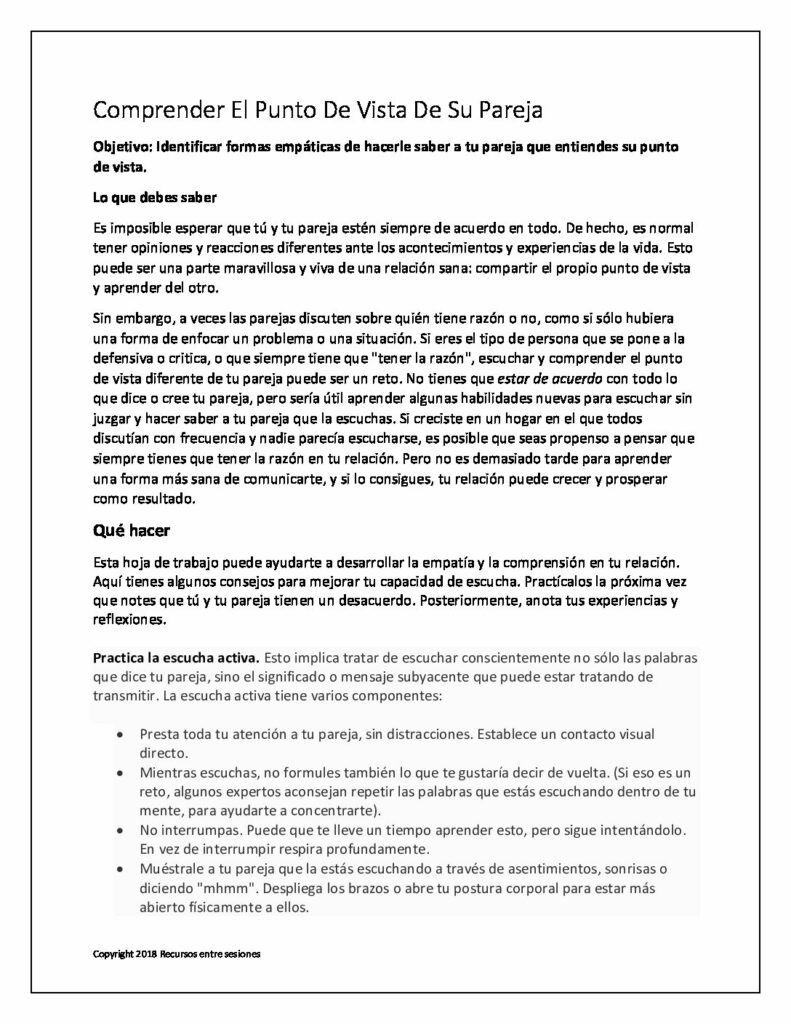This worksheet is designed to help people reflect on how they deal with authority figures. It asks people to consider how they have dealt with authority figures as far back as their childhood, and how they are dealing with authority figures in the present. The worksheet also suggests a number of simple assertive techniques. (social anxiety, passivity, shyness, workplace issues, relationships, 1118).
This worksheet is designed to help a person in your family with problems by using a family contract. Creating a family contract will help you addresses your role in your loved one’s struggles, identify the family members specific problems and behaviors, and determine the best strategies for providing useful assistance. A family contract is designed to help a family be proactive in supporting a family member, while still not impeding the person’s sense of self-reliance and self-worth. (contracts, 1118)
This worksheet is designed to help couples find new ways to show that they understand each other’s point of view. Skills covered in this worksheet include: active listening, responding non-defensively, positive communication. (couples communicating, marriage, 1018)
Most people simply accept uncertainty as a natural part of life, but people with anxiety disorders find it hard to accept uncertainty, particularly in certain situations. This worksheet is designed to help people tolerate uncertainty by using a five-step mindfulness technique that can help disengage from anxious thoughts and face uncertain situations without turning to others for help. (GAD, Generalized Anxiety Disorder, exposure, 1018)
This worksheet is designed to help people identify their thoughts about the worst things that could happen in various social situations. The worksheet also asks people to think about other possible outcomes. (social anxiety, 1018)
This worksheet is designed to help couples identify harmful or verbally abusive patterns in their communication partner and learn healthier ways of approaching conflicts. (couples communication, marital therapy, couples counseling, conflict management, 1018)
This worksheet is designed to help people identify the psychological and physical impact of chronic dieting. (Binge Eating Disorder, over-eating, weight control, 1018)
This worksheet is designed to help people reframe their self-criticism and develop a more compassionate attitude towards themselves. People are asked to think about the critical words they use to describe themselves and to substitute their put-downs with more compassionate thoughts. (self-esteem, self-talk, self-image,
This worksheet can help people understand the mental health benefits of owning a pet or even being around pets. The worksheet will help them decide if owning a pet is a commitment they want to make. (0918)
This worksheet is designed to help people accept their worries and other distressing thoughts. It may seem counter-intuitive, but therapists advise their clients not to try and stop their worrying or other intrusive thoughts, but rather to accept them while emotionally detaching from their content. This worksheet teaches people how to use visual metaphors to accomplish this. Four visual metaphors include: Don’t Struggle in Quicksand, Ignore Annoying Passengers in Your Car, Watching the Worry Train, and Clouds Floating By. (GAD, intrusive thoughts, anxiety, 0818)










